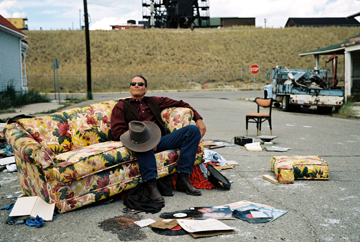 Sam Shepard surveys the wreckage of a broken home in ‘Don’t Come Knocking.’
Sam Shepard surveys the wreckage of a broken home in ‘Don’t Come Knocking.’
|
| Don’t Come Knocking\r\nStarring Sam Shepard and Jessica Lange. Directed by Wim Wenders. Written by Sam Shepard. Rated R. Opens Apr. 21 at UA Hulen. |
|
A D V E R T I S E M E N T
|
|
|
|
A D V E R T I S E M E N T
|
|
Untrue West
Wim Wenders and Sam Shepard wander the desert in Don’t Come Knocking.
By KRISTIAN LIN
One of America’s strongest playwrights, Sam Shepard harbors an enduring fascination with sundered families. One of Germany’s best-known filmmakers, Wim Wenders harbors an enduring fascination with the American West. These colossal artists managed to bring their fascinations into sync 22 years ago when they collaborated on Paris, Texas, a movie about a desert drifter trying to reconnect with the family he once knew. Now they’ve reunited for a similarly themed film called Don’t Come Knocking, and while flickers of the old magic are still in evidence, the movie as a whole comes off as a pale copy of many things.
Shepard plays Howard Spence, a movie star who unexpectedly disappears from the set of a Hollywood Western that’s being filmed in Utah. This isn’t the first time the hard-living Howard has pulled a stunt like this, but this time he seems to be at the end of a rope of some kind. He makes his way to Nevada to visit his mother (Eva Marie Saint — good to see her restart her film career in earnest after turning 80), whom he hasn’t seen in decades. She shocks him by informing him that he has a child who’s now grown, and she’s equally shocked in turn to discover that he didn’t know about this child’s existence. He tracks down the ex in Montana (Jessica Lange, Shepard’s real-life partner), who points him toward their son Earl (Gabriel Mann), a talented country singer who’s inherited Howard’s taste for illegal substances and cheap women and who’s none too pleased at his father’s sudden appearance after so many years.
The movie’s packed with references to Western movies and boasts some impressive desert and small-town vistas shot by cinematographer Franz Lustig, but it really has less to do with the likes of Brokeback Mountain and The Three Burials of Melquiades Estrada than it does with movies such as Lost in Translation and especially Broken Flowers, which are about middle-aged guys trying to recover something they’ve lost from the past. The comparison doesn’t flatter Don’t Come Knocking, mostly due to Shepard’s script. Fans of his will recognize the same themes and motifs from his great stage works. Yet this particular piece has little of the cohesion and power of Buried Child or A Lie of the Mind. There’s no apparent order to the scenes, and the character revelations later in the film are underwhelming and predictable. Earl’s anger at Howard is hard to figure out — he seems to think his father’s a loser, so why doesn’t anyone tell him the guy’s an international film star?
The furious speeches aimed at Howard are Shepardesque rants of the kind that work so well in the theater, but they seem to be here because they’re expected of the writer rather than coming from the character. As a result, the unmoored actors frequently seem to be overemoting for their Oscar clips, especially Lange (surprise) and Fairuza Balk as Earl’s girlfriend (no surprise). If this movie were a stage play, you’d say it needed to be workshopped.
Shepard’s presence in the lead role also proves to be a liability. Oh, he looks the part, just like he always does. He’s built a nice acting career for himself by trading on his tall, strapping, weather-beaten good looks. (Come to think of it, who else could have played Chuck Yeager in The Right Stuff?) Almost all his parts have been character roles, though, and a lead role exposes him as an actor who doesn’t have enough notes in his repertoire. He makes a creditable effort at the sort of layered performance that would give this movie weight, but the role needed Chris Cooper.
Better off are the actors who are allowed to play it cool. Sarah Polley portrays a girl who shadows Howard for mysterious reasons, and her disaffectedness well suits a character who gives away very little. Even better is Tim Roth as a guy from the bond company insuring the movie who’s sent to bring Howard back to the set. Clomping through the desert in a three-piece suit and wire-rimmed glasses, Roth’s dry-ice demeanor is most welcome here.
Presiding over all of this is Wenders, who for all his previous masterpieces remains utterly dependent on his material. (His movies can be unwatchable with the wrong script — remember The End of Violence or The Million Dollar Hotel?) He enlists the musical help of Shepard’s sometime stage collaborator T-Bone Burnett, and the legendary music producer adds to his sterling résumé of terrific movie soundtracks with some great moody songs in an old-school country vein, most of them sung by Mann. Wenders is also a flexible enough stylist to send up cowboy sentimentalism — he gives us clips from the soppily romantic Western that Howard’s working on. This is a funny way of telling what kind of movie Don’t Come Knocking isn’t. The trouble is, the movie that Wenders and Shepard do give us isn’t much of an alternative.
 Email this Article...
Email this Article...

